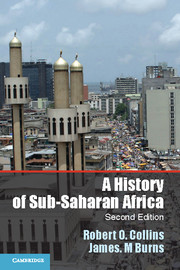Book contents
- Frontmatter
- Dedication
- Contents
- Acknowledgments
- Introduction
- Part I Foundations
- 1 The historical geography of Africa
- 2 Kingdoms on the Nile
- 3 The peoples of sub-Saharan Africa: society, culture, and language
- 4 Crops, cows, and iron
- 5 Northeast Africa in the age of Aksum
- 6 Empires of the plains
- 7 East Africa and the Indian Ocean world
- 8 The Lake Plateau of East Africa
- 9 Societies and states of the West African forest
- 10 Kingdoms and trade in Central Africa
- 11 The peoples and states of southern Africa
- Part II Africa in World History
- Part III Imperial Africa
- Part IV Independent Africa
- Index
- References
6 - Empires of the plains
Published online by Cambridge University Press: 05 June 2014
- Frontmatter
- Dedication
- Contents
- Acknowledgments
- Introduction
- Part I Foundations
- 1 The historical geography of Africa
- 2 Kingdoms on the Nile
- 3 The peoples of sub-Saharan Africa: society, culture, and language
- 4 Crops, cows, and iron
- 5 Northeast Africa in the age of Aksum
- 6 Empires of the plains
- 7 East Africa and the Indian Ocean world
- 8 The Lake Plateau of East Africa
- 9 Societies and states of the West African forest
- 10 Kingdoms and trade in Central Africa
- 11 The peoples and states of southern Africa
- Part II Africa in World History
- Part III Imperial Africa
- Part IV Independent Africa
- Index
- References
Summary
In the eleventh century, reports circulated in the bazaars of North Africa of a powerful African monarch who reigned far to the south, beyond the expanse of the Sahara Desert. His empire sent gold and slaves across to the Maghrib, where they percolated into the economy of the burgeoning Islamic world. This mysterious ruler, known as the ghana, was reputed to be the most powerful king in all of Africa. His wealth, and that of his successors, became legendary.
The ghana was not a myth but the ruler of an African kingdom called Wagadu, the capital of which, Koumbi Saleh, lay on the desert's edge in modern Mauritania. From there the rulers of Wagadu dominated a vast commercial empire that stretched from the Niger River in the south to the desert's edge in the north, and from the Senegal River valley in the west to the inland Niger delta in the east. Later it would be eclipsed by an even larger empire, Mali, which in time would itself be supplanted by the still larger empire of Songhai. Between and around the borders of these empires mushroomed an array of cities and states, all connected in a commercial web that stretched north to the Atlantic and south to the tropical forests of Central Africa.
- Type
- Chapter
- Information
- A History of Sub-Saharan Africa , pp. 78 - 95Publisher: Cambridge University PressPrint publication year: 2013



